I’m kicking off the Micronutrients and Macronutrients with SIBO series with Methylcobalamin B12 vs Cyanocobalamin (+ SIBO).
Vitamin B12 and SIBO
In 2014 when I was first diagnosed with SIBO, I was so deficient in vitamin b 12 that I did weekly vitamin B-12 injections to my stomach.
(Insert sarcasm) It was so much fun that I don’t ever want to have you to go through the same. (My latest testing results showed that I am 14% above average with my B12 stores, FYI.)
I know that if you have SIBO now (or have yet to be diagnosed) a Vitamin B12 deficiency is very likely.
And hence, this might be a very beneficial post for you.
Forms of Vitamin B
There are multiple forms of vitamin B, all of which play important roles in cell metabolism.
- B1 (Thiamine): Essential for carbohydrate metabolism and nerve function.
- B2 (Riboflavin): Important for energy production, cell function, and growth.
- B3 (Niacin): Helps with energy production, metabolism, and nervous system function.
- B5 (Pantothenic Acid): Necessary for synthesizing coenzyme A, which is important for metabolism.
- B6 (Pyridoxine): Involved in amino acid metabolism, neurotransmitter synthesis, and hemoglobin production.
- B7 (Biotin): Supports metabolism of carbohydrates, fats, and proteins.
- B9 (Folate or Folic Acid): Vital for DNA synthesis and cell growth, especially important during pregnancy.
- B12 (Cobalamin): Important for DNA synthesis, red blood cell formation, and neurological function.
Make note: B vitamins are water-soluble, which means that the body does not store them in large amounts. Therefore, they need to be consumed regularly through diet or dietary supplements.
The form of vitamin B that we are focusing on today is, of course, B12.
Methylcobalamin B12 vs Cyanocobalamin (+ SIBO)
Click HERE to save the Methylcobalamin B12 vs Cyanocobalamin (+ SIBO) information for later.
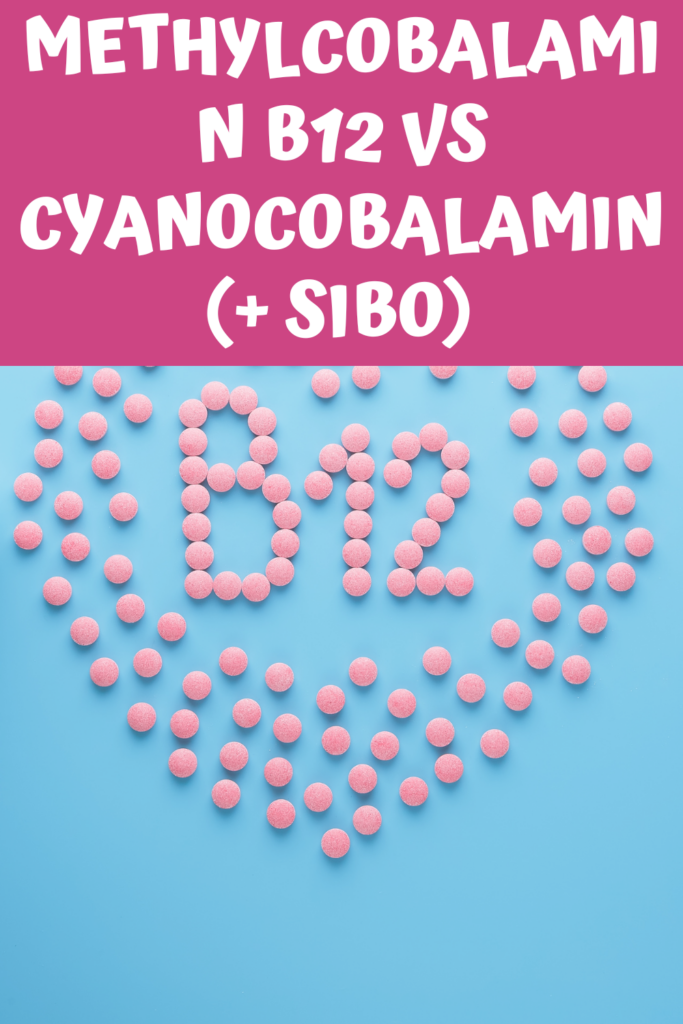
A common complication of bacterial overgrowth is cobalamin (vitamin B12) deficiency.
Patients with normal intestinal enteric flora rely on gastric intrinsic factor to bind to vitamin B12 to permit absorption in the ileum.
Chris Kresser states,
Although rates of B12 deficiency are much higher in vegetarians and vegans than in omnivores, that doesn’t mean it’s rare in omnivores. According to a study, approximately 1 in 20 omnivores are B12 deficient. In my practice I’d estimate the rate at closer to 1 in 15, possibly because I see a lot of people with gut problems and that is one of the risk factors for B12 deficiency.
Vitamin B12 deficiency occurs in four stages, beginning with declining blood levels of the vitamin (stage I), progressing to low cellular concentrations of the vitamin (stage II), an increased blood level of homocysteine and a decreased rate of DNA synthesis (stage III), and finally, pernicious anemia (stage IV).
What is Vitamin B12?
Vitamin B12, also known as cobalamin, is a water-soluble vitamin required for many reactions in your body as well as for the health of your nerve cells, red blood cells, and DNA.
Its most important role is as a methyl group donor, which is a crucial step in many of our main detoxification pathways.
Methylcobalamin B12 vs Cyanocobalamin
There is so much talk about methylcobalamin vs cyanocobalamin.
So how do they differ, and which is the superior form for you?
Cyanocobalamin
Cyano B12 is a cheap, synthetic form of vitamin b, containing a slightly toxic effect, inactive form of B12 that is made with a cyanide donor and is used commercially.
It has been historically used in supplements and for B12 injections due to its stability and lower cost.
The synthetic cyanocobalamin form is the most stable form because the cyanide molecule has the greatest attraction to the cobalamin and protects it from extreme conditions (like high temperatures).
However, it doesn’t absorb well and requires methyl groups to detoxify it.
When cyano B12 does absorb, it converts to hydroxocobalamin (hopefully discarding of the cyanide in the process) and then to methylcobalamin and adenosylcobalamin.
When taken orally, absorption of this form is drastically reduced if you have any gastric acid problems. (Source)
Vitamin B12 Methylcobalamin
Methylcobalamin, the kingpin, one of the two active, natural forms of B12.
It is the naturally occurring form of vitamin B12 found in food sources and is also used in some supplements.
Methylcobalamin B is considered more bioavailable than cyanocobalamin because it doesn’t require conversion in the body to be utilized.
It helps reduce homocysteine concentrations and generates SAMe (S-adenosyl methionine), the most important methyl donor in your body, supplying methyl groups for crucial chemical reactions to help maintain your health.
Where methyl B12 shows its greatest utility is with people suffering from degenerative neurological symptoms, where it’s often the only promising treatment.
It bypasses several potential issues in the absorption cycle and helps relieve or completely reverse symptoms. (Source) And, in fact, is readily absorbed and utilized by the body, making it a preferred form for individuals with certain health conditions or those looking for optimal B12 absorption.
Choosing Between the Different Types of Vitamin B 12’s
The medical advice for those with specific medical conditions needing Vitamin B12 is that while both forms of vitamin B12 can effectively raise B12 levels in the body, methylcobalamin is often preferred for its superior bioavailability and potential benefits to neurological health.
The main differences between the two come down to these three things:
- price
- bioavailability
- potential neurological benefits
Why are people with SIBO deficient in Vitamin B12?
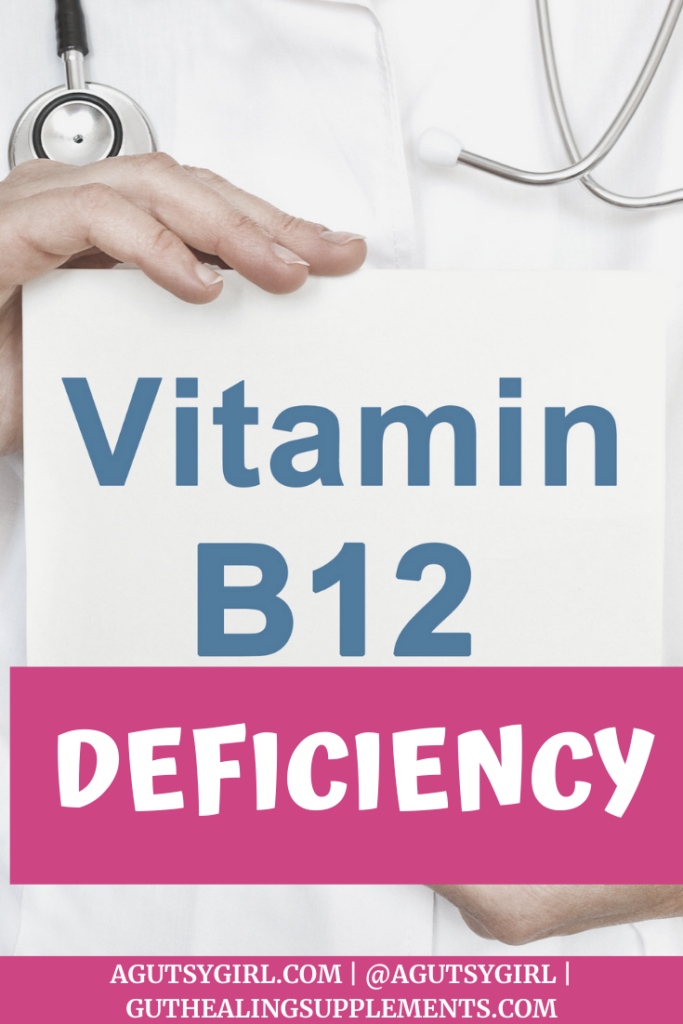
Those with digestive disorders, in general, are more susceptible to a Vitamin B12 deficiency because typically they are losing a lot of nutrients (both micro and macro) via the passing of too much stool.
In addition, or alternatively, A Vitamin B12 deficiency affects those with SIBO oftentimes because they produce less stomach acid. In order to convert vitamin B12 properly, adequate stomach acid is critical.
Those with SIBO (and the general population as a whole) are also at a risk of deficiency due to:
- intestinal dysbiosis
- leaky gut and/or digestive tract gut inflammation
- atrophic gastritis or hypochlorhydria (low stomach acid)
- pernicious anemia (autoimmune condition)
- medications (especially PPIs and other acid-suppressing drugs)
- alcohol
- exposure to nitrous oxide (during surgery or recreational use)
(Source: Chris Kresser’s ADAPT Program)
What are B12 deficiency symptoms?
Click HERE to save these symptoms of a Vitamin B deficiency for later.
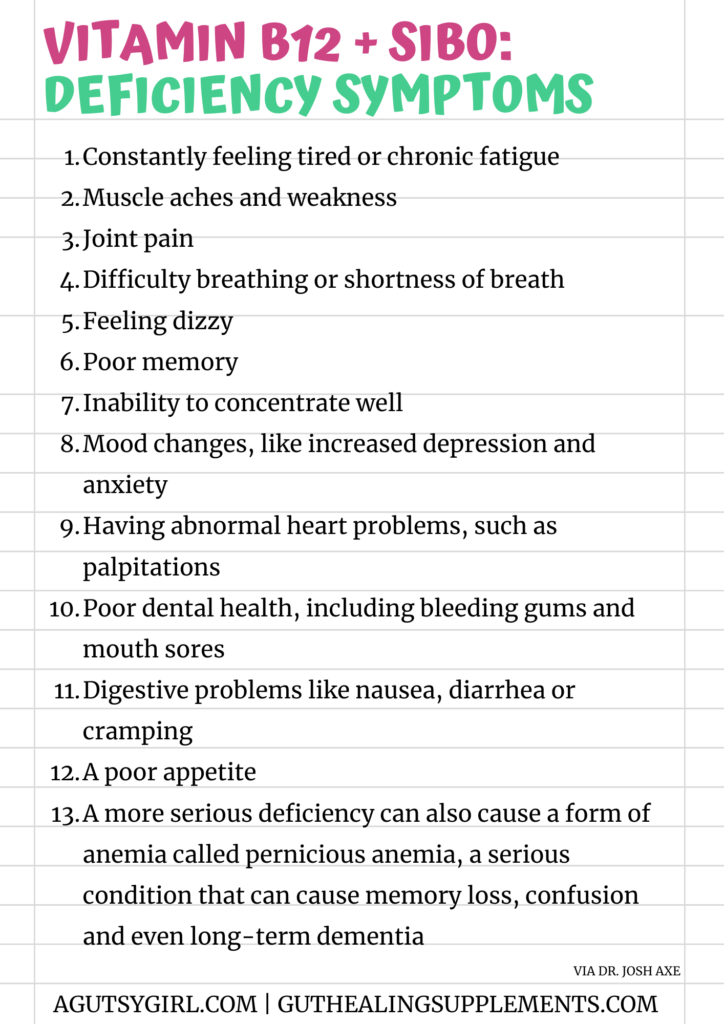
According to Dr. Axe, here is a list of Vitamin B12 deficiency symptoms:
- Constantly feeling tired or chronic fatigue
- Muscle aches and weakness
- Joint pain
- Difficulty breathing or shortness of breath
- Feeling dizzy
- Poor memory
- Inability to concentrate well
- Mood changes, like increased depression and anxiety
- Having abnormal heart problems, such as palpitations
- Poor dental health, including bleeding gums and mouth sores
- Digestive problems like nausea, diarrhea or cramping
- A poor appetite
- A more serious deficiency can also cause a form of anemia called pernicious anemia, a serious condition that can cause memory loss, confusion and even long-term dementia
How to recover from Vitamin B12 deficiency?
According to Chris Kresser,
B12 is the only vitamin that contains a trace element (cobalt), which is why it’s called cobalamin. Cobalamin is produced in the gut of animals. It’s the only vitamin we can’t obtain from plants or sunlight. Plants don’t need B12 so they don’t store it.
Even still, I was eating meat, not following a Vegan diet, and was severely B12 deficient.
This goes beyond simply eating meat.
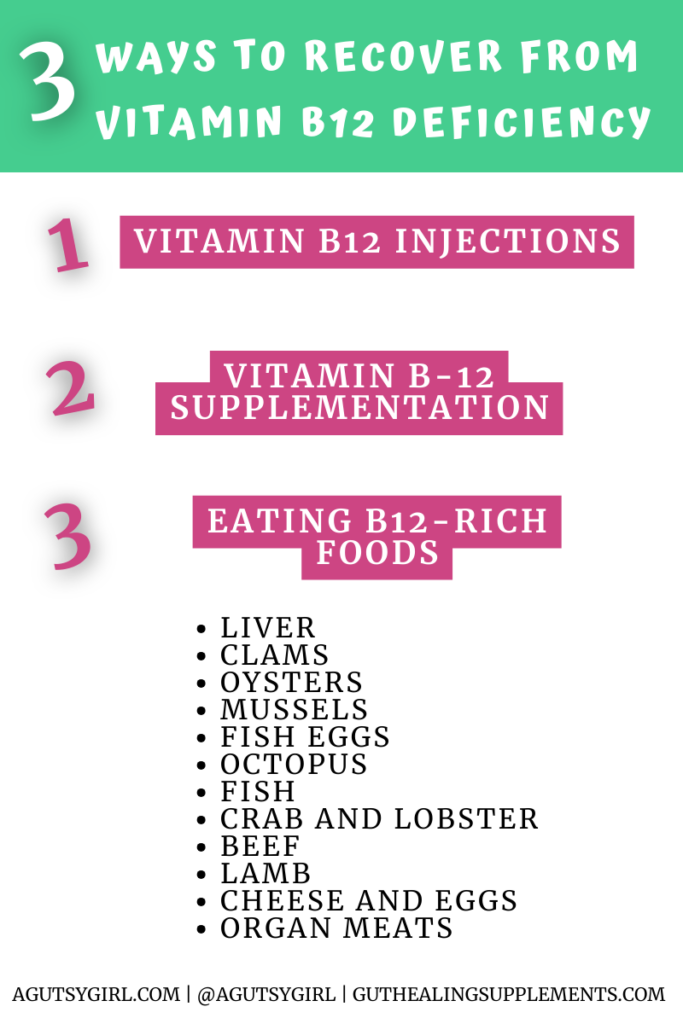
Recovering from a Vitamin B12 deficiency could mean any or all of the following things:
1. Vitamin B12 Injections
“As always, adequate treatment depends on the underlying mechanism causing the problem. People with pernicious anemia or inflammatory gut disorders like Crohn’s disease are likely to have impaired absorption for their entire lives, and will likely require B12 injections indefinitely. This may also be true for those with severe B12 deficiency causing neurological symptoms.” (Chris Kresser’s ADAPT Program.)
We have an entire post on agutsygirl.com regarding B Complex and B12 injections for getting in higher doses of the essential nutrient.
If you are interested in learning more, be sure to read B Complex vs B12 Injections HERE.
2. Vitamin B12 Supplementation
“Cyanocobalamin is the most frequently used form of B12 supplementation in the US. But recent evidence suggests that hydroxycobalamin (frequently used in Europe) is superior to cyanocobalamin, and methylcobalamin may be superior to both – especially for neurological disease.” (Chris Kresser’s ADAPT Program.)
If you’re looking to take Vitamin B as oral supplements, then you must ensure you’re taking the best B 12 supplement in the best form, methylcobalamin.

You’ll find high-quality B12 (in both capsule + liquid form) through my Fullscript Online Dispensary under “Sarah Kay Hoffman’s Favorites; Gut Health: SIBO Focus.
3. Eating B12 Rich Foods
While I believe that a plant-based diet has so many health benefits, it does not provide the B12 in higher levels needed (found in animal products).
Here are some foods high in B12:
- liver
- clams
- oysters
- mussels
- fish eggs
- octopus
- fish
- crab and lobster
- beef
- lamb
- cheese
- eggs
- organ meats
Yes, those are all animal-based foods.
As it relates to Vegetarian sources of B12, Chris Kresser states,
A common myth amongst vegetarians and vegans is that it’s possible to get B12 from plant sources like seaweed, fermented soy, spirulina and brewers yeast. But plant foods said to contain B12 actually contain B12 analogs called cobamides that block intake of and increase the need for true B12. My intention here is not to bash vegetarian and vegan diets. (I was a macrobiotic vegan myself at one point, for crying out loud!)
(This is another reason I’m not entirely confident anymore that you can heal the gut strictly on a Vegetarian diet.)
MG vs MCG
Supplements, including the B12 ones listed above, are oftentimes in measurements: mg and mcg.
So what’s the difference between mg vs mcg?
- MG = milligram
- MCG = microgram
Therefore, conversions look like this:
1 milligram (mg) is equal to 1000 micrograms (mcg).
How are your Vitamin B12 levels?
Track your B12 levels and signs/symptoms of deficiency via our gut healing journaling SYSTEM + consider a Vitamin B12 blood test.
If you enjoyed this article on Methylcobalamin B12 vs Cyanocobalamin (+ SIBO), you might also enjoy:
Xox,
SKH
🤰 bloating be gone! weight loss through optimal gut health for women
💃ʜᴇᴀʟ ʏᴏᴜʀ ɢᴜᴛ. ʜᴇᴀʟ ʏᴏᴜʀ ʟɪfe.
🫶🏻 founder gutbyome.com

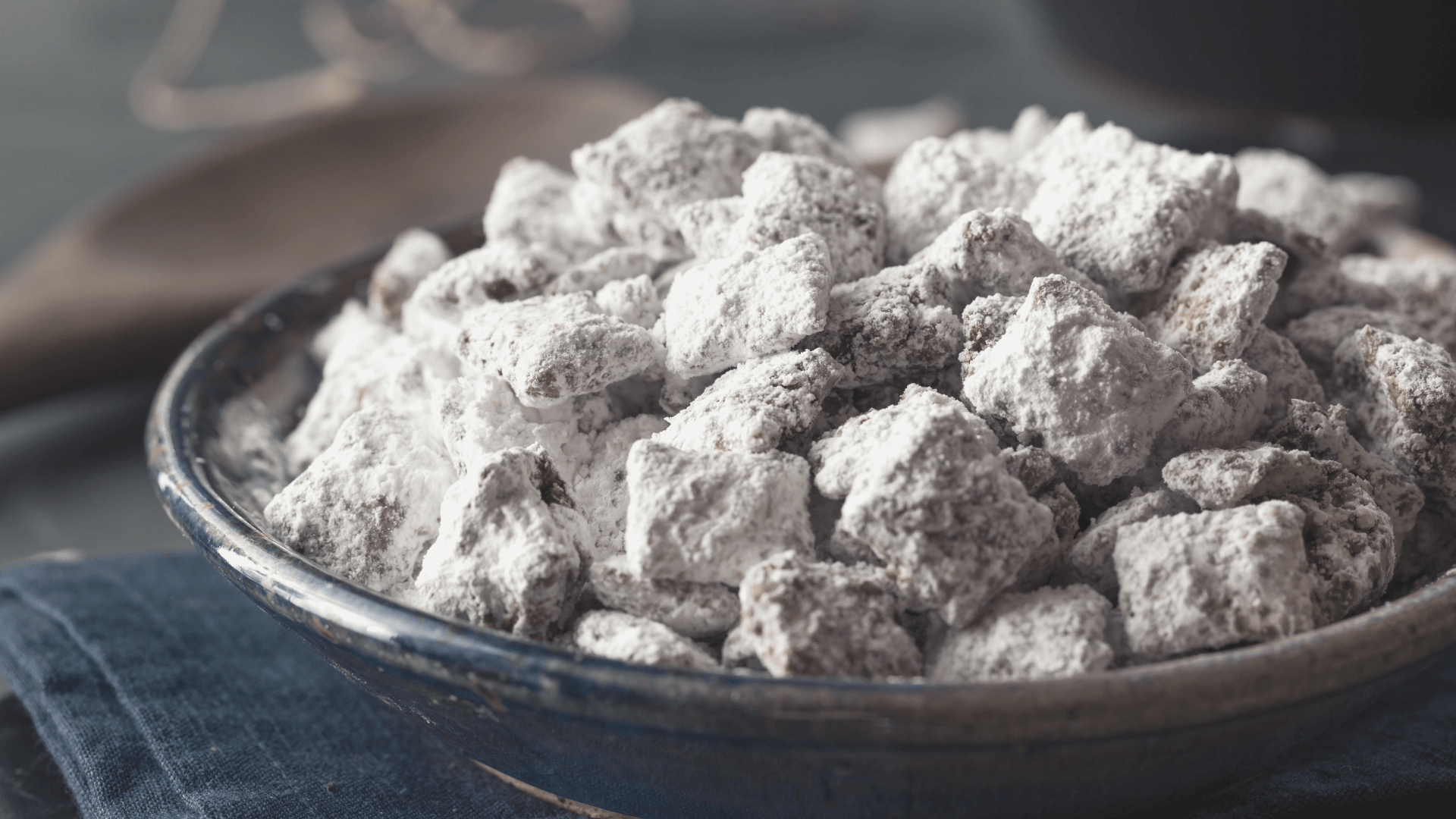
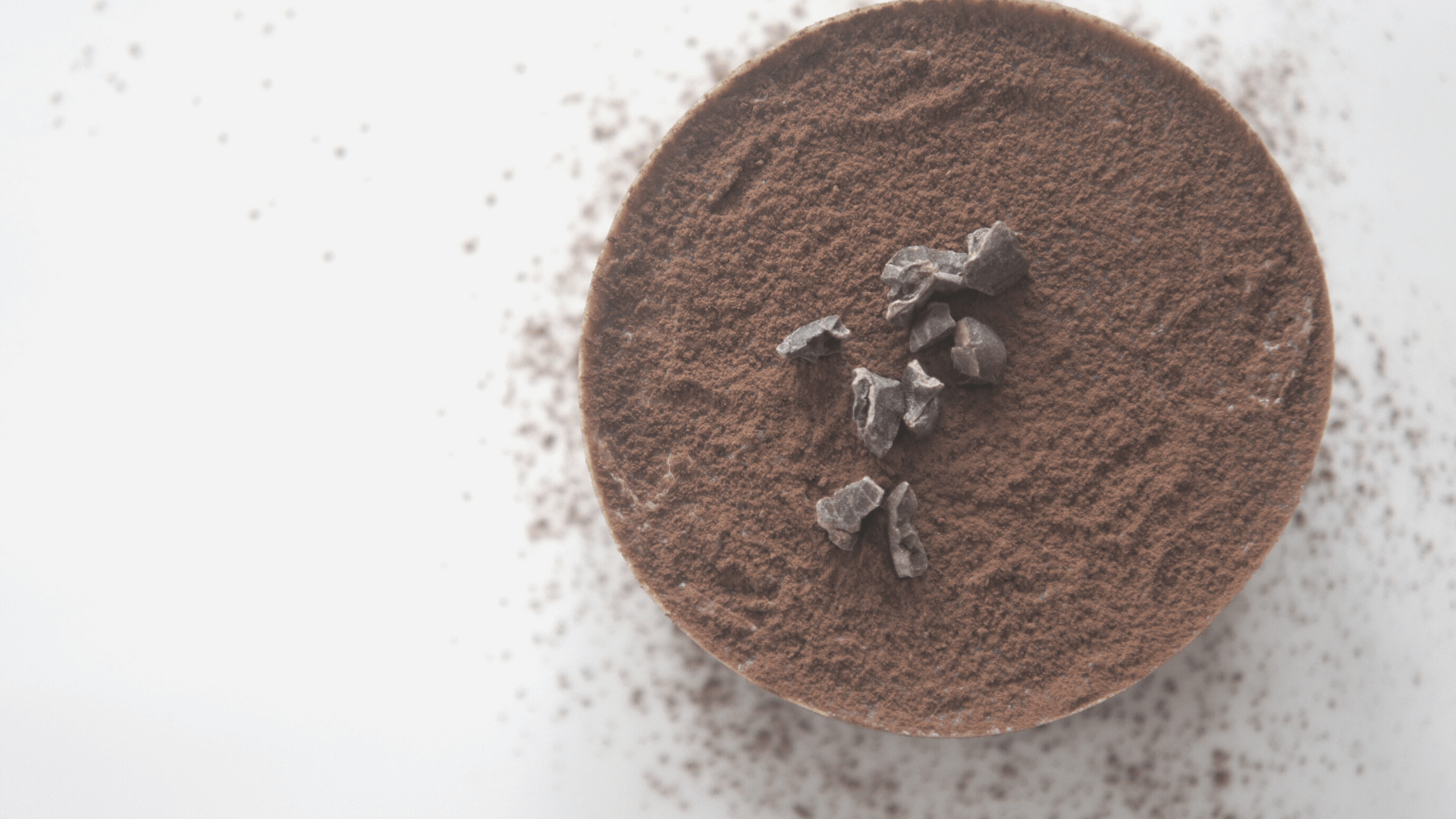
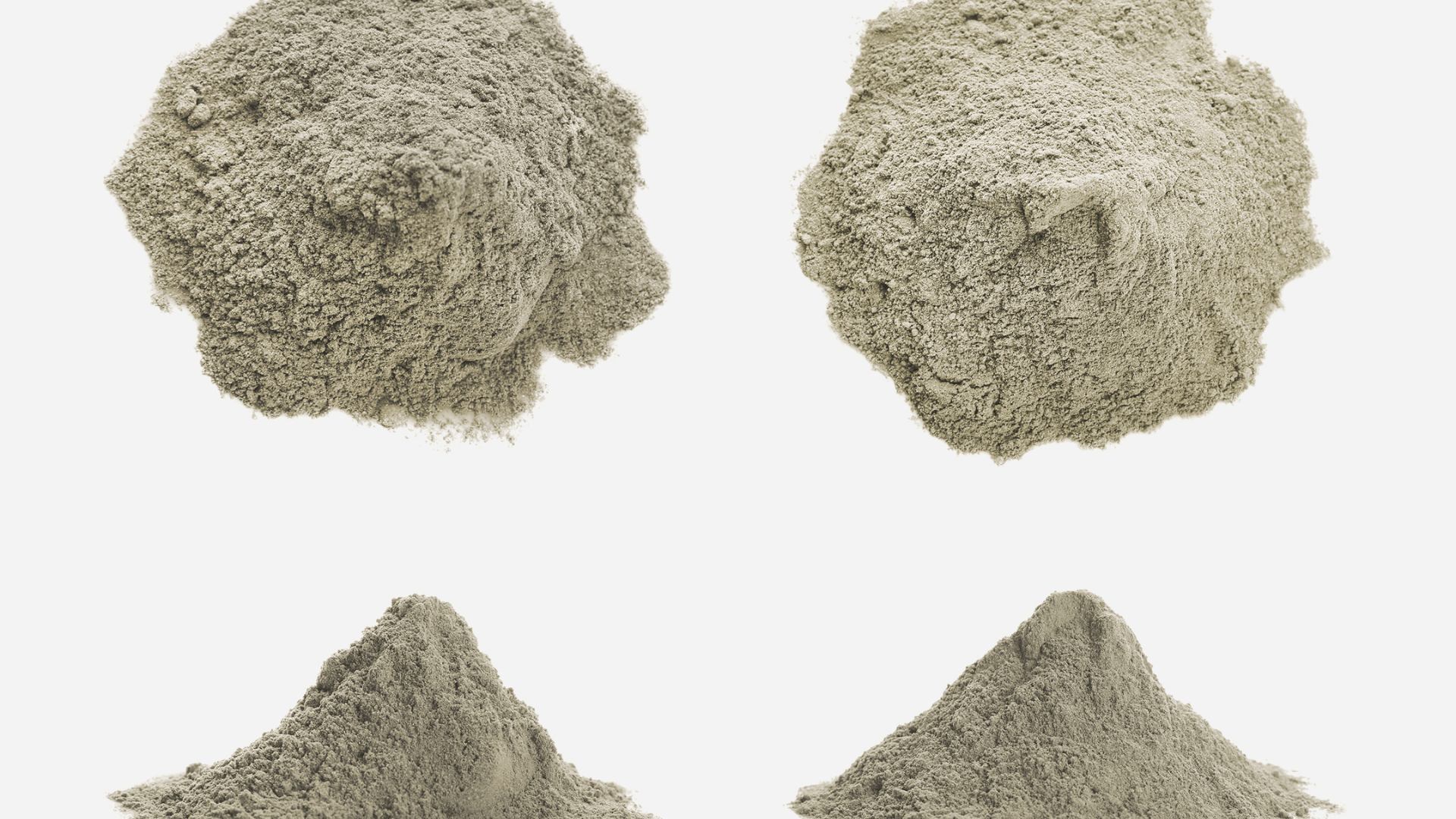



Dear maam I am vegan, due to b12 deficiency. I want to start non veg. Please tell me how frequently i should eat non veg, what quantity and for how much period.
Thanks for this Sarah. I hope you have a great time on your vacation. I have been having some very similar symptoms like the ones mentioned in this article. I’m going to look into it.
M.D.
My son has/had SIBO. His B12 was extremely elevated. His doctor said this was a sign of SIBO. I’m not sure exactly why, I think some bacteria produce B12?
I’d also love to know. This is the first I’m hearing about B12 and my son has neurological issues and chronic SIBO that is incredibly difficult to treat
Injections , supplementation never raise in my brother-in-law. He definitely has neurological symptoms with loss of memory , not being all there and fatigue .
Any suggestions?
I have several symptoms of SIBO. Also anemia and b12 deficiency. How would you recommend being tested for SIBO as my doctor seems to think it isn’t real or isn’t my issue. I feel confident it is could be. I have developed food allergies and Chronic rosacea. Plus I have developed extreme dark circles under my eyes with no explanation. I need help with being tested. Thank you!
There is a post on my site about the SIBO test. You can read it here –> https://agutsygirl.com/2015/12/29/how-to-do-the-sibo-breath-test/ There is also this resource I put together –> https://agutsygirl.com/2020/01/15/buyers-guide-to-sibo-tests/
Isn’t it lovely that she doesn’t reply? It’s sad to lead us this far into the water but not let us in your boat! I was really excited about your blog and the similarities between our condition but not so much anymore.
Karen – You don’t have to follow along or get any of the thousands of words, research, and information I provide here to people – FREE of charge. I have a thousand comments that haven’t been responded to yet, but I do my best to keep up.
Now I see why you call yourself “Gutsy Girl”!! Good for you.
I am grateful for your site.